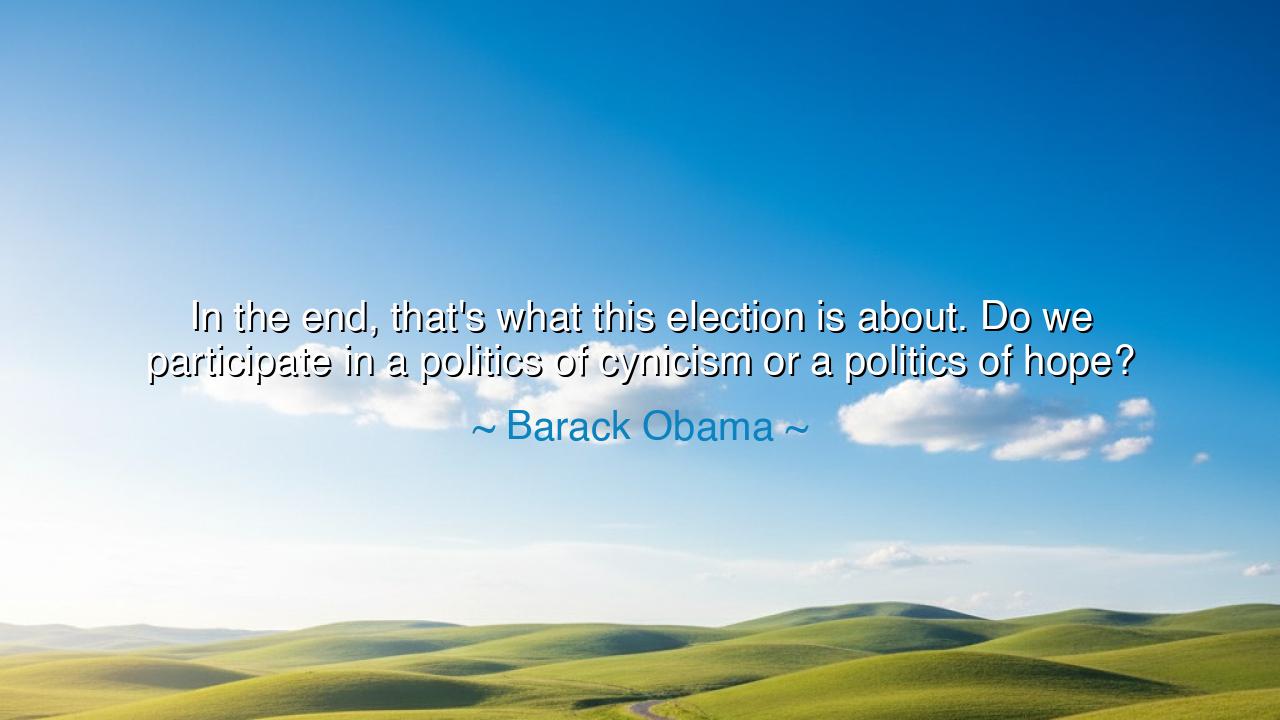
In the end, that's what this election is about. Do we participate
In the end, that's what this election is about. Do we participate in a politics of cynicism or a politics of hope?






When Barack Obama spoke the words, “In the end, that’s what this election is about. Do we participate in a politics of cynicism or a politics of hope?”, he was not merely speaking of an election — he was speaking of the eternal struggle for the soul of humanity. His words echoed the timeless conflict between despair and belief, between those who sneer at the future and those who dare to shape it. Cynicism is the armor of the defeated; it is the whisper that says, “Nothing will change.” But hope, radiant and defiant, is the force that has rebuilt civilizations and lifted generations from darkness into light. Obama’s question is therefore not only political — it is profoundly moral and spiritual.
In the tradition of the ancients, this quote recalls the teachings of those who believed that the heart of every society rests upon the character of its citizens. To the Greeks, politics was not merely governance; it was the expression of a people’s soul. If that soul became corrupted with cynicism, the city would decay, not by war or famine, but by loss of faith in itself. Obama, standing at the crossroads of modern disillusionment, summoned the people to choose differently — to believe again, to imagine that integrity and compassion could still be instruments of power. For him, hope is not naïveté; it is the discipline of vision, the courage to build when others choose to mock.
History is filled with the ruins of cynicism. When the Roman Republic fell, it was not merely because of enemies at its gates, but because its citizens ceased to believe in their own ideals. Yet history also sings of the victories of hope — of Abraham Lincoln, who in the blood-soaked days of civil war still spoke of “the better angels of our nature.” Like Obama, Lincoln understood that progress does not come from perfection, but from faith in possibility. Every great age of humanity — the Renaissance, the Enlightenment, the Civil Rights Movement — was born because someone refused to surrender to the coldness of cynicism.
Obama’s own rise embodied this struggle. Born of diverse roots, raised amid skepticism and division, he became a symbol of what happens when hope becomes action. His message was not that hope guarantees success, but that without it, no success is possible. Cynicism builds walls; hope builds bridges. Cynicism paralyzes; hope mobilizes. His words called the people not to sentimentality, but to responsibility — for hope is not a feeling, but a choice renewed every day against the tide of doubt.
There is a profound stoicism hidden in his vision: to hope in a broken world is an act of moral bravery. For hope is not blind — it sees the flaws, the cruelty, the corruption — and yet chooses to act. The cynic is safe in his bitterness, for he risks nothing. The hopeful are vulnerable, for they dare to believe that the world can be changed, and in doing so, they invite disappointment. Yet it is they, and not the cynics, who carry humanity forward. As the ancients might say, to hope is to fight with the heart of the gods within us.
Consider Nelson Mandela, who after twenty-seven years in prison emerged not as a man consumed by vengeance, but as one radiant with forgiveness. He, too, could have chosen cynicism — could have said that the world was too cruel for hope. Instead, he chose to believe in reconciliation, and through that belief, healed a nation. Mandela, Obama, and every leader of spirit share this truth: hope is not weakness; it is the fiercest strength of all.
Thus, the lesson is clear for all who live in any age: guard your heart against cynicism, for it is poison disguised as wisdom. Hope is not foolishness; it is the seed of all creation. When despair whispers that your voice does not matter, remember that every change in history began with one voice refusing silence. So, strive to be among those who choose the politics of hope — not only in nations, but in your own life. For as long as you believe in something better, and work to make it so, you are already part of the victory that endures beyond elections, beyond generations — the triumph of the human spirit itself.






AAdministratorAdministrator
Welcome, honored guests. Please leave a comment, we will respond soon